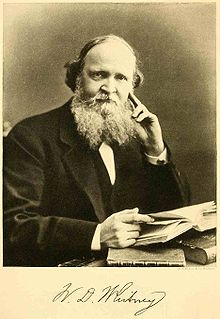- William Dwight Whitney
-
William Dwight Whitney (1827–1894) was an American linguist, philologist, and lexicographer who edited The Century Dictionary.
Contents
Life
William Dwight Whitney was born in Northampton, Massachusetts on February 9, 1827. His father was Josiah Dwight Whitney (1786–1869) of the New England Dwight family. His mother was Sarah Williston (1800–1833).[1] He entered Williams College at fifteen, graduating in 1845. He continued studying and worked at a bank in Northampton for several years, then assisted his older brother Josiah Whitney on a geological survey of the Lake Superior region in 1849. For three years, he studied Sanskrit in Germany, and gained wide reputation for his scholarship in the field. At Yale, he became professor of Sanskrit in 1854, adding comparative philology in 1869. He also taught modern languages at the Sheffield Scientific School. He served as secretary to the American Oriental Society from 1857 until he became its president in 1884. He died at his home, on Whitney Avenue, on June 7, 1897 [2]
Whitney revised definitions for the 1864 edition of Webster's American Dictionary, and in 1869 became a founder and first president of the American Philological Association. He wrote metrical translations of the Vedas, and numerous papers on the Vedas and linguistics, many of which were collected in the Oriental and Linguistic Studies series (1872–74). He wrote several books on language, and grammar textbooks of English, French, German, and Sanskrit.
His Sanskrit Grammar (1879) is notable in part for the criticism it contains of the Ashtadhyayi, the Sanskrit grammar attributed to Panini. Whitney describes the Ashtadhyayi as 'containing the facts of the language cast into the highly artful and difficult form of about four thousand algebraic-like rules (in the statement and arrangement of which brevity alone is had in view at the cost of distinctness and unambiguousness).'[3]
In his Course in General Linguistics in the chapter on the 'Immutability and Mutability of the Sign', Ferdinand de Saussure credits Whitney with insisting on the arbitrary nature of the linguistic signs.
Although he suffered from a heart ailment in his later years, he was editor-in-chief of the first edition of the respected Century Dictionary, which appeared from 1889 to 1891. On August 28, 1856 he married Elizabeth Wooster Baldwin. She was the daughter of Roger Sherman Baldwin, US Senator and Governor of the State of Connecticut. They had six children:[1]
- Edward Baldwin Whitney was born August 16, 1857, became Assistant US Attorney General, and had son mathematician Hassler Whitney.
- Williston Clapp Whitney was born April 2, 1859 but died March 11, 1861.
- Marian Parker Whitney was born February 6, 1861.
- Roger Sherman Baldwin Whitney was born January 6, 1863, but died January 17, 1874.
- Emily Henrietta Whitney was born August 29, 1864.
- Margaret Dwight Whitney was born November 19, 1866.
Works
- Atharva Veda, editor with Rudolf von Roth (1856–1857)
- Language and the Study of Language: Twelve Lectures on the Principles of Linguistic Science (1867)
- On Material and Form in Language (1872)
- Oriental and Linguistic Studies - First Series: The Veda, The Avesta, The Science of Language (1872)
- Oriental and Linguistic Studies - Second Series: The East and West, Religion and Mythology, Hindu Astronomy (1874)
- Darwinism and Language (1874)
- The Life and Growth of Language: An Outline of Linguistic Science (1875)
- Essentials of English Grammar for the Use of Schools (1877)*
- Sanskrit Grammar: Including Both the Classical Language, and the Older Dialects, of Veda and Brahmana (1879, 2d edn. 1889)
- Language and its Study: with Special Reference to the Indo-European (lectures) (1880)*
- Logical Consistency in Views of Language (1880)
- Mixture in Language (1881)
- The Roots, Verb-forms and Primary Derivatives of the Sanskrit Language (supplement to Sanskrit Grammar) (1885)
- Practical French Grammar (1887)*
- A Compendious German and English Dictionary (1887)*
- The Century Dictionary (editor) (1889–1891)
- Introductory French Reader (1891)*
- Max Müller's Science of Language (1893)
- Atharva Veda Samhita 3 volumes (translator)
- The History of Sanskrit Grammar (Indian reprint edition of Sanskrit Grammar)
- Manuscript Diary (photo reprint)
NB: Dates marked * may not be first publication.
Modern collections
- Oriental and Linguistic Essays
- On the Vedas
- Whitney on Language: Selected Writings of William Dwight Whitney
References
- ^ a b Benjamin Woodbridge Dwight (1874). The history of the descendants of John Dwight, of Dedham, Mass. 2. J. F. Trow & son, printers and bookbinders. pp. 833–837. http://books.google.com/books?id=ghcfAAAAMAAJ&pg=PA833.
- ^ Cite error: Invalid
<ref>tag; no text was provided for refs namednytimes1; see Help:Cite errors/Cite error references no text - ^ Whitney, William Dwight. Sanskrit Grammar. Reprinted 2002, Motilal Banarsidass, Delhi. ISBN 81-208-0620-4
External links
 Chisholm, Hugh, ed (1911). "Whitney, William Dwight". Encyclopædia Britannica (11th ed.). Cambridge University Press.
Chisholm, Hugh, ed (1911). "Whitney, William Dwight". Encyclopædia Britannica (11th ed.). Cambridge University Press.- Seymour, Thomas Day (1895). William Dwight Whitney. Yale University. pp. 28.
- William Dwight Whitney
- The Descendants of John Whitney, pages 486 - 490[dead link]
- Full bibliography of William Dwight Whitney (JSTOR)
- The Century Dictionary gratis online and they are "planning a CD version".
- Judith Ann Schiff, "Advice for the language-lorn," Yale Alumni Magazine, March/April 2010 (description of life and career).
Categories:- 1827 births
- 1894 deaths
- American linguists
- American lexicographers
- Sanskrit scholars
- American philologists
- Grammarians of French
- People from Northampton, Massachusetts
- Sanskrit grammarians
Wikimedia Foundation. 2010.

